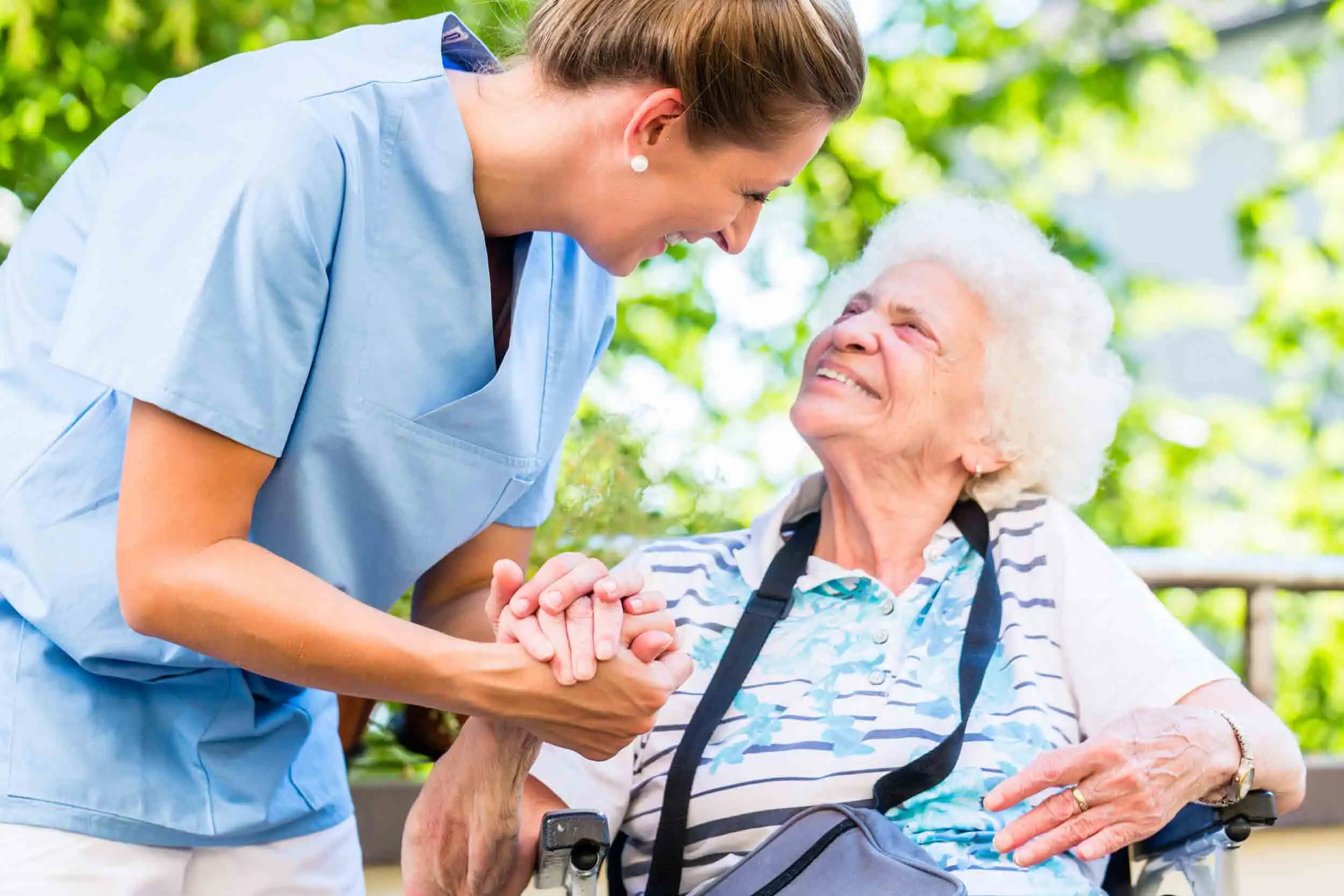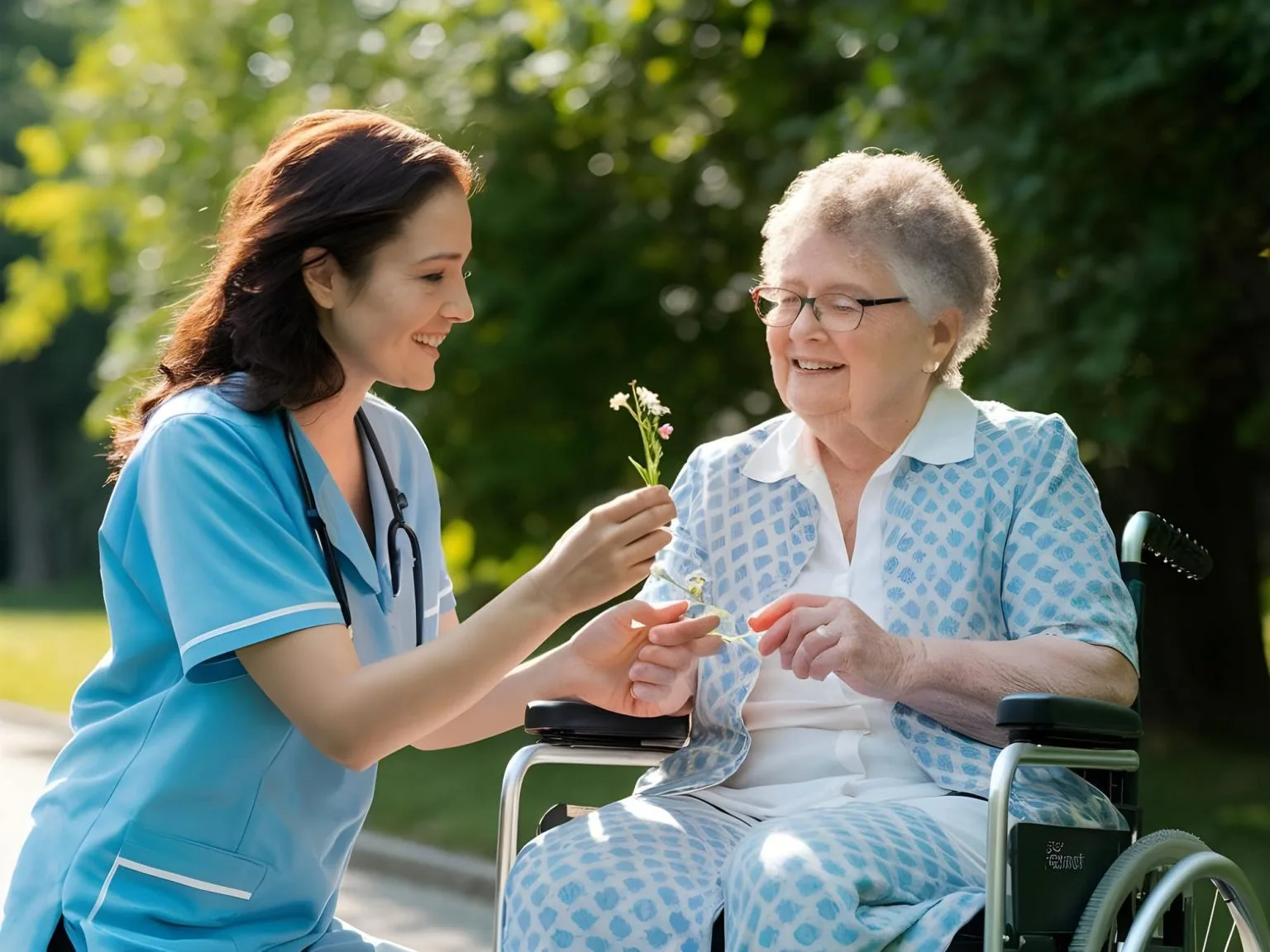
Choosing Caregiver for Elderly Parents [2025 Guide]
Despite the growing trend of the elderly population in many countries around the world, it is better to ensure the peace of mind for your parents by hiring a caregiver, sometimes due to the busyness of children. Choosing caregiver for elderly parents can really be a significant challenge in caring for this group of people. An elderly caregiver who possesses the necessary abilities, experience, and commitment can address the emotional and physical needs of the elderly and meet their requirements with respect, flexibility, and empathy.
Choosing the right in-home caregiver is a sensitive and influential decision that directly affects the quality of life of the elderly and the comfort of families. A professional caregiver not only takes care for the elderly but also helps to maintain independence, improve morale, and create a safe and peaceful environment. In this article from the humanhealthmag, you will become familiar with the most important characteristics of an ideal in-home elderly caregiver, the benefits of in-home care, and a practical guide for hiring an elderly caregiver, enabling you to make the best decision for your loved ones with confidence.
Who Is an Ideal Caregiver for the Elderly?
Due to the physical ailments and limitations that come with aging, elderly individuals often require assistance from a caregiver for daily tasks such as meal preparation, medication management, cleaning, and more.
When we need a caregiver for elderly parents, the importance and sensitivity of choosing the right caregiver for an our older loved one become clear. Especially if he/she has specific challenges such as dementia or Alzheimer’s, which require special care. Selecting an experienced elderly caregiver who is fully familiar with the special physical conditions of the elderly, such as using a cane or walker, can significantly improve the quality of life and comfort of our loved ones at home. While caring for the elderly can be a truly rewarding experience, caregivers often face common challenges such as:
- Emotional and physical stress
- Managing a healthy lifestyle
- Financial stress
- Sleep deprivation
- Understanding common psychological issues

The caregiver for the elderly is an experienced and specialized individual in elderly care and their daily routines. In addition to professional skills, they possess commitment, compassion, and a strong spirit. They support the elderly with kindness and patience, playing an effective role in daily activities, improving their quality of life, and reducing feelings of loneliness. A professional in-home caregiver not only performs their duties accurately and regularly but also creates a friendly environment, bringing peace and security to the elderly. Then, an in-home caregiver provides non-medical assistance with daily living tasks for adults who require personal care.
5 Benefits of Hiring a Private In-Home Caregiver
In-home care for the elderly is a highly suitable option for seniors who prefer to stay close to their families and maintain their personal space.
- One of the most important benefits of in-home care for elderly is that by providing care for the elderly at home, they can receive expert care from geriatric health specialists in a familiar and beloved environment, ensuring their comfort and peace of mind. Their daily needs, including rest and sleep, proper nutrition, and health care, are met in the best possible way.
- Experienced elderly caregivers provide appropriate care and services based on the physical and mental health needs of the elderly, including skin care, oral hygiene, physical exercises, low-impact cardio exercises for seniors, and vital signs monitoring.
- Certainly, an in-home elderly caregiver can act as a care partner for seniors, fostering greater communication and interaction. This connection not only improves the quality of care but also facilitates emotional growth and enhances the mental well-being of the elderly.
- Many of us are aware that many seniors are left alone in their homes, which can lead to loneliness and isolation. An experienced in-home elderly caregiver provides companionship and support, increasing feelings of security and satisfaction for the elderly.
- By choosing caregiver for elderly parents, they will not need to visit hospitals or health centers, and they will receive the necessary health and medical services in the comfort of their own home. This allows them to receive treatment in a familiar and safe environment and have their needs met promptly.

7 Factors to Consider Before Choosing Caregiver for Elderly Parents
Hiring an in-home caregiver for elderly parents is a crucial decision that significantly impacts the quality of life of the elderly, especially if they have specific physical conditions. A suitable elderly caregiver is someone who is familiar with the physical needs of the elderly and can care for them according to their specific circumstances.
Choosing an in-home caregiver for elderly parents is a sensitive and crucial issue, especially when psychological crises such as anxiety and depression arise in the elderly. The individual characteristics and emotional conditions of the elderly require careful attention and understanding from professional caregivers who have the necessary experience and knowledge. These characteristics can include sensitivity to the depth of anxiety, depression, or obsessive-compulsive disorder in the elderly.
When choosing caregiver for aging parent who needs more care, it is best to consider some of the characteristics of a professional caregiver. 7 prominent characteristics of a suitable elderly caregiver are:
Mental Well-being
Most elderly patients are in the final stages of their lives and may not even need hospitalization. They may be immobile at home and struggle with many problems in their final stages. Some elderly patients cannot bathe or use the toilet independently. They may also have urinary incontinence or Surgery for incontinence in the elderly male. Maybe this question will arise for you that how to manage incontinence in the elderly? In these situations, they need the help of a suitable elderly caregiver. A suitable elderly caregiver should have a sense of compassion and kindness and treat the elderly with humility, even if the elderly become aggressive when they need help.
The mental health of the elderly caregiver is important because these caregivers face challenges and stresses related to caring for the elderly in their daily interactions. Strong mental health in caregivers directly affects the quality of services they provide. Mental health helps caregivers cope better with occupational stress and pressures, establish better communication with the elderly, and better respond to their needs.
High Communication Skills
Strong communication skills help caregivers to deeply listen to the needs and wants of the elderly and respond to them accurately. Strong communication with the elderly creates a sense of security and comfort for them and improves their mental and emotional well-being. Therefore, developing strong communication skills is vital and highly important for elderly caregivers.
Sufficient Patience and Experience
Since caring for patients, especially elderly patients, requires a lot of tolerance, the elderly caregiver should be able to listen to the patient’s words patiently, as the elderly may speak very slowly or have difficulty concentrating.
In caring for the elderly, complex situations and challenges may arise that require a patient and tolerant caregiver. A high threshold of patience helps caregivers maintain their composure and control in stressful situations and high psychological pressure and make the best decisions for caring for the elderly. The elderly caregiver should also be patient in dealing with the elderly’s family members, as they may not be in a good emotional state because one of their loved ones needs 24-hour care.
Responsibility
In this profession, caregivers care for and manage important issues, including sensitive medical matters for people with dementia or elderly people with mobility limitations who need to be moved in a wheelchair. Therefore, responsibility in caregivers more than anything else ensures that they provide the necessary health and medical care on time, accurately, and compassionately and adhere to the ethical and legal issues related to their profession. This responsibility gives them professional trust and respect and positively affects the quality of services provided.

Attention to Detail
In the nursing profession, any behavior and work, such as medication management, proper nutrition, personal hygiene of the elderly, and providing a safe and hygienic environment, directly or indirectly affects the quality of care. Careful attention to these details leads to the early detection of problems and adverse symptoms in the elderly, and appropriate measures are taken to address them. Therefore, for an elderly caregiver, special attention to detail and adherence to every point is very important to facilitate improving and optimizing the lives of the elderly.
One of the main requirements of the elderly care profession is care to prevent accidents. As you know, middle-aged and elderly patients are more prone to serious illnesses such as cancer, Alzheimer’s, and osteoporosis than younger people. If the elderly caregiver pays attention to their complaints, they can prevent serious problems in the elderly.
Creativity
Caring for the elderly who are about to develop Alzheimer’s and dementia is more difficult than caring for other elderly people, and a suitable elderly caregiver should be more creative in addressing their emotional and physical needs to not only care for them but also help slow down the progression of the disease. Art therapy is a good response in elderly people with dementia.
Throughout the day, they may encounter situations and issues that require creative and innovative solutions. The elderly can participate in various creative activities. For example, drawing beautiful paintings, creating artistic objects using recycled materials, writing stories and memories, gardening, playing mind games and solving puzzles, participating in light sports activities such as yoga or tai chi, and doing psychotherapy activities such as meditation and journaling.
Often, it is the duty of the elderly’s companions to encourage them to participate in social and creative activities. Ultimately, these activities give the elderly a sense of happiness, satisfaction, and self-awareness.
High Physical Strength
During daily tasks, caregivers must have a lot of physical strength because some care requires lifting and moving the elderly, moving in different environments, and having high physical strength. This may increase their endurance and reduce their fatigue over time. Some elderly patients easily become confused and disoriented and need to be treated in a way that makes them feel more relaxed and secure.
If the caregiver’s physical condition cannot tolerate these conditions, unfortunately, in some cases, there is no hope for the elderly’s condition to improve again. So, please pay close attention to this issue when choosing a caregiver for aging parent who needs more care.
In addition, the cultural conditions of the elderly person’s family should also be considered when choosing caregiver for elderly parents. Why? Because interaction and coordination with the family are very important. Attention to these matters ensures that the elderly person receives professional and specialized care in their home environment while maintaining independence and a good quality of life.

5 Simple Steps to Choosing Caregiver for Elderly Parents
How to care seniors at home? Choosing the best elderly caregiver for the care and support of your elderly loved ones at home is very important. To do this, you can consider the following steps as a guide to choosing the most suitable in-home caregiver for Elderly Parents.
- Define Your Expectations and Needs
Defining your expectations and needs from an elderly caregiver helps us identify individuals who cannot meet the serious expectations and needs of our elderly and avoid choosing them. By specifying our needs, we can choose the best elderly caregiver based on their abilities, skills, and qualifications, ensuring that the elderly receive the best care. Keep in mind that the hardships of the nursing profession are significant, and when hiring an elderly caregiver, remember that the better you pay, the better services you will receive in the future.
- Assess the Elderly’s Level of Need
Assessing the elderly’s level of need is very important so that we can choose a more suitable elderly caregiver for them. With this assessment, we can accurately identify the elderly’s needs and problems and choose a caregiver with skills and experience that match these needs. This assessment helps us determine a specific level of care, communication, and medical skills. With this method, the elderly can benefit from high-quality care tailored to their needs.
- Review the Elderly Caregiver’s Previous History
Researching the previous individuals under the elderly caregiver’s care is very important in choosing caregiver for elderly parents. By examining the experiences and feedback of caregivers’ work history, we can better understand their performance, quality of care, and the satisfaction of their previous patients. This research shows that caregivers who have the abilities, experience, and positive attitude in providing elderly care are the best options.
- Monitor Performance
Monitoring the performance of the elderly caregiver is essential to ensure that the individual chosen to care for the elderly person in need of care is suitable. This monitoring includes evaluating the caregiver’s skills, experience, and abilities. For this purpose, various methods can be used, such as observing performance in real situations, reviewing references, and work history. This monitoring helps us ensure that the caregiver meets standards, has work motivation, and cares about elderly care.
- Find the Best Caregiver for Your Elderly
By interviewing different specialists, the family can obtain more information about the caregivers’ skills, experience, and abilities and choose a caregiver according to their culture and needs. These interviews can include explaining the family’s needs, preferences, and expectations regarding elderly care. By consulting with specialists, the family can choose the best elderly caregiver based on their language and values. This approach ensures that the chosen caregiver is compatible with the family’s culture and can provide better care.

How to Find a Caregiver for Elderly Parents?
Finding the best elderly caregiver is always a major challenge; choosing a caregiver who can provide care tailored to the elderly’s needs and situation is very important. There are various methods to find the best elderly caregiver. Choosing an elderly caregiver who can understand the psychological and medical needs of the elderly is essential. Also, the presence of experienced caregivers with patience, respect, and empathy can provide greater comfort and well-being in the home environment.
An effective method is to use reliable resources such as health centers, elderly care centers, and health service clinics. These centers usually have a list of experienced and qualified elderly caregivers who can be introduced to you. You can also use the opinions and experiences of others about caregivers they have worked with in the past. This can be done by consulting with friends, family, and people who have experience with elderly caregivers. The opinions and recommendations of others can be a good guide in choosing elderly caregivers.
Additionally, you can search for in-home elderly caregivers through job advertisements and the internet. In this method, you can access their resumes and work experience and compare different specialists. Interviewing caregivers is also an effective way to find the best elderly caregiver. In this interview, you can ask questions about their experience, expertise, attitude, and personal abilities. This interview can help you determine the capabilities required for elderly care.
Final Considerations for Choosing Caregiver for Elderly Parents
In-home elderly care is an excellent solution for enhancing the quality of life of our loved ones. These services help maintain independence, promote positive behavior, and reduce costs. Therefore, when choosing caregiver for elderly parents, pay attention to factors such as caregivers’ skills, licenses, and other people’s reviews. With these right choices, you can give your loved ones a better and happier life.
Ultimately, when choosing an in-home elderly caregiver, factors such as fair compensation, encouragement, and a positive approach are also very important. Elderly caregivers, given their abilities and responsibilities, should be appreciated and encouraged to maintain high productivity and quality of service. Finally, the optimistic approach of caregivers in performing their duties and providing quality services has a positive impact on the health and lives of the elderly.
Could you help us make this content even better? What do you love, and what can we improve? Share your thoughts below, feedback is the key to creating better content for YOU. If you also have an experience in this regard, please share it with us and others.

Frequently Asked Questions
What are the key qualities to look for in an elderly caregiver?
When choosing a caregiver, prioritize qualities such as patience, empathy, and strong communication skills. They should be reliable, respectful, and have experience with the specific needs of your loved one, such as dementia care or mobility assistance. Checking their references and certifications is also essential to ensure they have the necessary qualifications.
How do I address any concerns or issues that may arise with the caregiver?
Establish clear communication channels from the start and schedule regular check-ins to discuss any concerns. If issues arise, address them promptly and directly with the caregiver. If necessary, involve the caregiving agency or consider seeking a replacement if the problems cannot be resolved.
